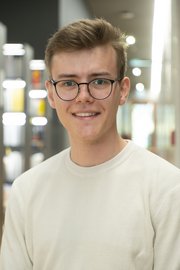
Sensor Technology
In A Nutshell
Sensor Technology presented by Prof. Dr. Thorsten Uphues
External content
Profile of the study program
Sensors have become an indispensable part of our everyday lives. We find them almost everywhere: in cars, smartphones, smartwatches and household appliances. They are also becoming increasingly important in Industry 4.0 and are a component of the smart factory. The "Sensor Technology" degree program deals intensively with this key technology and looks at the function and use of sensors for various sectors. These include the automotive industry, aviation technology, consumer electronics, medical technology and even the food industry.
Practice in studies
Basic internship
A basic internship is not required. However, we recommend practical work in relevant companies before the start of your studies so that you can get an idea of future professional practice in good time.
Practical study semester
The practical study semester usually takes place in the fifth semester. It covers a continuous period of 18 weeks. In addition, students attend courses that accompany their practical studies.
Study Ambassador

My name is Roman Surma and I am a student ambassador for the computer science program. Since I study at Coburg University, I can answer your questions directly. So if you want to know what the study program is all about or what it's like to live in Coburg, just send me an email: Roman-Alexander.Surma[at]stud.hs-coburg.de
Study contents
At the beginning of the study program, the electrotechnical and electronic basics are taught that are required to electronically control and read out sensors. In the further course of studies, the focus is on chemical and physical sensor technology as well as digital signal processing. A wide range of electives allows students to follow their own interests. Of course, sensors are also the focus of the bachelor thesis, which can also be written in cooperation with a company.
Basic Studies (1st and 2nd semesters):
- Mathematics 1 + 2: Differential calculus and linear algebra; integrals and ordinary differential equations.
- Computer science: Applied computer science and computer-aided measurement technology
- Physics 1 + 2: Electricity and ray optics; Mechanics, oscillations and waves
- Physics-Mathematics-Informatics Workshop 1 + 2
- Electronic components
- Chemistry
Main study(3rd and 4th and 6th and 7th semesters):
- Chemical sensory analysis
- Physical sensor technology
- Math 3 + 4: Multidimensional and Vector Analysis; Partial Differential Equations and Integral Transformations
- Physics-Mathematics-Informatics Workshop 3 + 4
- Physics 3 + 4: Thermodynamics and Fluid Mechanics; Electrodynamics and Wave Optics
- Computational Metrology
- Physics 5 + 6 (quantum mechanics and atomic physics; solid state physics)
- Digital Signal Processing
- Student project
- Bachelor thesis and bachelor seminar
Students can also choose from a wide range of electives on interesting and current topics, e.g. fuel analysis, laser technology or technical acoustics.
Practical semester (5th semester):
incl. courses accompanying practical training
Working scientifically
At the ISAT, the Institute for Sensor and Actuator Technology at Coburg University of Applied Sciences, students can work on current research projects and get to know the world of science in the process. The institute cooperates intensively with industry and regularly works on topics that target the products of tomorrow.
Curriculum and examination regulations
The [modul plan] shows the distribution of subjects over the seven-semester study program. The [study and examonation regulations] form the legal basis of the study program. Questions about the contents of the study program can be answered by the study advisor.
Career perspectives
Sensors ensure accuracy, quality, safety and flexibility in our lives. They provide the data basis for ordinary products to become smart systems. By selecting the right sensors, engineers decide on the potential of products and whether they work reliably. Due to constant miniaturization, sensors are often not even noticed. But they are the key to whether a product or process is safe. And they decide what features it has. In order to advance our society through technological developments, sensor engineers will be needed to develop, select and integrate the right sensors into products.
Master's program
After successful completion of the bachelor's program, good graduates have the opportunity to continue their education in various master's programs.
